Jailed Iranian Writer Dies OF COVID-19 After Delay In Treatment
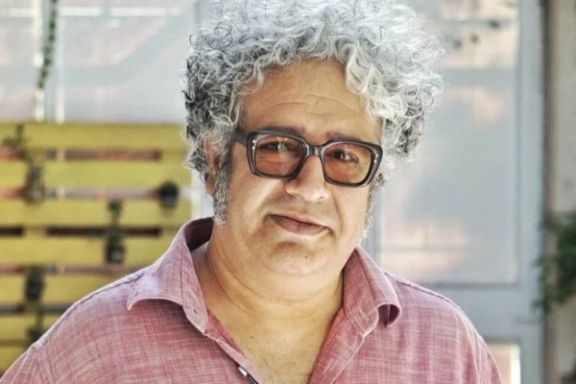
Imprisoned Iranian writer Baktash Abtin has died of Covid-19 complications after he was denied timely treatment by officials at Tehran’s notorious Evin prison.

Imprisoned Iranian writer Baktash Abtin has died of Covid-19 complications after he was denied timely treatment by officials at Tehran’s notorious Evin prison.
Abtin succumbed to the virus on Saturday following days of medically induced coma as his health condition was deteriorating. His friends and colleagues charged that prison officials had delayed sending him to a hospital for ten days.
The Iranian Writers' Association said in their earlier statements that Abtin’s condition was the direct result of the authorities’ “deliberate delay” to start his treatment.
The poet and writer was sentenced to six years in prison in May 2019 for publishing documents about the history of the Writers’ Association and some comments against censorship.
Along with writers Reza Khandan Mahabadi and Kayvan Bajan, Abtin was charged with “propaganda against the state” and “assembly and collusion against national security”. These are vague charges used against political prisoners for criticism against the government.
Both courts and prosecutors in Iran are controlled by the hardline Judiciary which is accountable to Supreme Leader Ali Khamenei. Judges and prosecutors work in tandem with orders they receive from the Judiciary.
In October 2021, PEN America bestowed its 2021 PEN/Barbey Freedom to Write Award to the three imprisoned writers. Just before Abtin’s death, PEN demanded his release.

Families of victims who died when Iran shot down an airliner in 2020 gathered at Tehran's Imam Khomeini Airport and the crash site Saturday to demand justice.
Families who last year had gathered at the airport on the first anniversary of the tragedy that claimed the lives of all 176 onboard carried photos of their loved ones and posters that read "Compensation Can Never Replace Justice".
Iran’s government announced in December 2020 that all victims would receive the $150,000 compensation but many families have refused to take the money and insist they just want punishment for those responsible for the death of their loved ones.
"Our hearts are still bleeding after two years remembering that night …The truth must come out, it shouldn't be sacrificed to suit the expedience [of politicians]. We insist on truth and justice," the father of one of the victims is seen saying in a speech in a video posted on Twitter.
Victims' families then chanted "Truth, Justice", a slogan that also appeared on their posters.
"Why did you fire missiles at our children? Why did they kill them? Why did they hide the truth about what they had done?" another video shows him saying in his speech while insisting that victims' families wanted the truth to be revealed and those responsible for the order to fire missiles at the airliner be punished, not compensation.
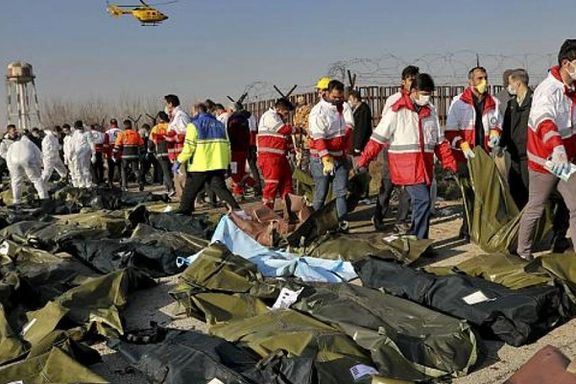
Families later went to the crash site in Shahed Shahr in the southwest of the capital where they were joined by locals who chanted "Truth, Justice" as a helicopter, apparently belonging to security forces, flew overhead.
Ukraine's flight PS752 was shot down by two air-defense missiles fired by Iran’s Revolutionary Guard (IRGC) in the morning of January 8, 2020, as it took off from Tehran’s Imam Khomeini International Airport.
Despite expecting retaliation for IRGC missiles fired at bases in Iraq hosting US troops only hours earlier and expecting a retaliation, the IRGC which is responsible for air defense of the capital did not close the civilian airspace in the early morning hours of 8 January.
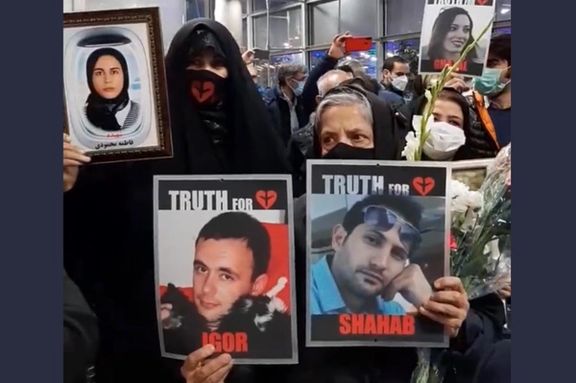
For three day the authorities claimed they knew nothing of the real cause of the crash but after an amateur video emerged on social media that showed missiles were fired at the plane, Iran had to admit the military had shot down the plane by “human error”.
Tehran has not allowed an independent investigation or provided full answers to questions by other countries, including Ukraine. The trial of ten low-ranking military personnel began in November. Many among victims' families objected to the trial demanding "the real culprits" to be held accountable.
In May 2021, an association representing the families of victims announced on social media that some families had received an electronic message from the military prosecutor handling the case informing them that high-ranking officials cannot be prosecuted.
Tens of victims were Canadian citizens or lived in Canada where their families gathered at one of the victim's home Friday evening in Toronto.
A spokesperson for Global Affairs Canada in a statement Friday called the downing of the Ukrainian airliner a "Canadian tragedy" and said they "remain committed to seeking answers and pursuing justice".
Canadian Prime Minister Justin Trudeau met virtually with the families on Friday. "Our government will not rest in our fight for justice and accountability," he tweeted after the meeting.
Meanwhile, Iran's security forces Saturday arrested a civil rights activist, Yashar Tabrizi, soon after he posted a video of himself remembering the victims at the crash site near Tehran. In the video Tabrizi, a taxi driver, said he had gone there with his family to light a remembrance candle and to demand those responsible to be put on trial.

Iranian expats visiting Iran recently have reported that intelligence agents interrogated them at the airport to collect financial and personal infomation.
Rouydad24, a news website in Tehran quoted a passenger who arrived in Tehran on a flight from the Netherlands, as saying, "A security officer took my wife and me to the interrogation room after passport control and asked us to fill in a form about our addresses, income, and place of residence." He said that several others were sitting in the same room filling forms. He added that the officers also asked them about other countries they have visited.
Airport officials have distanced themselves from the development by making it clear that they had nothing to do with the interrogations that continue to be made by intelligence organizations.
The Iranian government and its top officials including President Ebrahim Raisi, Judiciary Chief Gholamhosein Ejei and Foreign Minister Hossein Amir-Abdollahian have recently called on Iranian expats to return to Iran and invest in their homeland. It is still not known whether the interrogations are linked to this, or it is an independent project carried out by intelligence organizations.
The development has been a cause for concern among Iranians living abroad as it is also not clear whether everyone who has been interrogated was allowed to leave the airport or some of the passengers have been held by the authorities.
Iran is known for taking dual citizens hostage and using them as pawns in their negotiations with other countries. Several Iranian officials including former Foreign Minister Javad Zarif had frequently put forward the idea of exchanging such hostages with pro-regime Iranians in prison in other countries.
The Iranian Rouydad24 news website says the interrogations are against the government's general policies about expat Iranians.
The Foreign Minister has recently said that his ministry has set up a website that Iranians abroad can visit and find out if they might be arrested when travelling to Iran. He said that the website is linked to the Iranian Judiciary and the intelligence services. Iran has more than a dozen intelligence services. The most powerful ones are the Ministry of Intelligence and the Intelligence Organization of the IRGC. Recently, the Iranian police has also announced the launch of its own intelligence organization.
These organizations do not necessarily work in coordination. Recently, while the Intelligence Ministry told Iranian Academic Saeed Madani that he is free to go to the United States for a sabbatical, the IRGC's Intelligence Organization stopped him at the airport and confiscated his passport. Madani has complained to the Judiciary Chief, so far to no avail.
Some Iranian travellers said officials handpick a few passengers from a flight and take them to a room for interrogation. Others have said that occasionally, all Iranian passengers of a flight are taken for interrogation as officials hope they can find someone with a problem among a larger number of passengers. Most visitors being interrogated reportedly come from Europe. However, some may be coming from the United States as there are no direct flights between Iran and the United States.
Another passenger coming from Germany gave almost the same description about his case but added that it appeared the officers were particularly looking for dual nationals among the passengers.
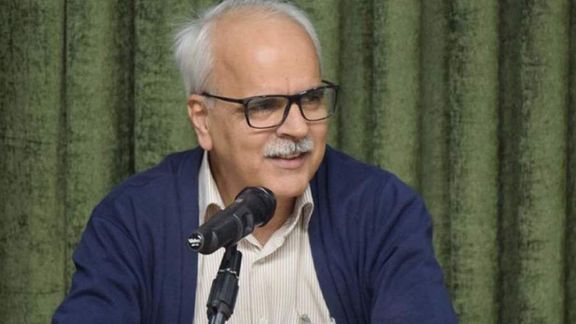
A professor and former polictical prisoner has written to Chief Justice after being denied exit from Iran to begin a one-year research post at Yale University.
Sociology professor Saeed Madani said he was stopped at an airport gate December 7 as he was about to board while security checked his United States visa, and that a Revolutionary Guards (IRGC) intelligence officer then told him, without an explanation, that he was barred from leaving the country and kept Madani's passport.
Madani said in his letter to Chief Justice Gholamhossein Mohseni-Ejei he had two days earlier been summoned by the intelligence ministry, questioned for four hours, and then told he was free to leave Iran.
It is not unprecedented for someone leaving Iran to discover at the airport they are unable to leave. In 2005, Emaddedin Baghi, who campaigns against capital punishment, was stopped minutes before boarding a flight to Paris, where he was due to receive an award from the French government.
Baghi, also chairman of Society to Defend Prisoners' Rights, was again denied exit in 2009, when he was travelling to receive the Martin Ennals Award, which is given by ten international human rights organizations.
Unofficial foreign travel bans often prevent activists, political figures, and former officials from participating in international academic events and seminars.
On several occasions in recent months, Mohseni-Ejei has criticized foreign travel bans levied by tax authorities, banks, and legal authorities, but not by security and intelligence bodies. Any or all could act against activists. Mohseni-Ejei told judiciary officials October 11 that for people to find out they were unable to leave only at the airport was “damaging.”
In his letter, Madani wrote that such actions, regardless of who was behind them, violated Articles 9, 20, 30, and 33 of the Iranian constitution, and violated the right to freedom of movement given by Article 13 of the Universal Declaration of Human Rights and Article 12 of the International Covenant on Civil and Political Rights.
In an earlier letter, sent to the Minister of Culture and Islamic Guidance Mohammad-Mehdi Esmaili in November, Madani protested against the ministry banning publication of his books without a court order.
Madani − whose research interests include poverty, drug addiction, child abuse, and prostitution − belongs to the banned Nationalist-Religious Alliance, a group of small non-violent religious opposition groups that favor political reform and welfare economics. He has been sentenced and imprisoned several times for membership of the alliance and for "propaganda against the state." In 2016, he was exiled to the southern port city of Bandar Abbas after four years of an eight-year prison sentence served at Evin prison, Tehran.
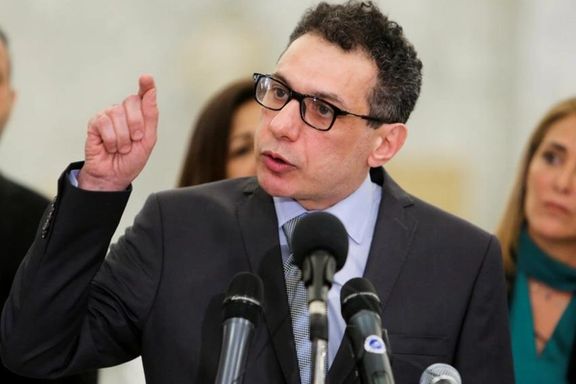
Nizar Zakka, a Lebanese who spent about four years in prison in Iran on political charges, has established an NGO to support and help the release of people held hostage for unjust reasons.
Kylie Moore-Gilbert, an Australian-British expert on Islamic studies who was also jailed in Iran for about two years, said Wednesday that the non-profit NGOaims at preventing the inhumane act of hostage taking while advocating for the unjustly detained and their families.
“As a former hostage who was kidnapped for almost 4 years in Iran, I have experienced firsthand, the pain, suffering and betrayal that comes with it”, Zakka said on the website of Hostage Aid Worldwide.
He was arrested on vague charges of espionage for the US and was released in June 2019 after an appeal by Lebanese President Michelle Aoun. After his release, Zakka talked about various types of torture he suffered in prison, including spending about 18 months blindfolded.
Zakka, who was also a US permanenet resident, was invited to Iran in 2016 by a top official of former president Hassan Rouhani’s government but he was arrested by the Revolutionary Guard.
Iran has detained many dual nationals who have visited the country and used them as bargaining chips against Western countries, according to human rights organizations.
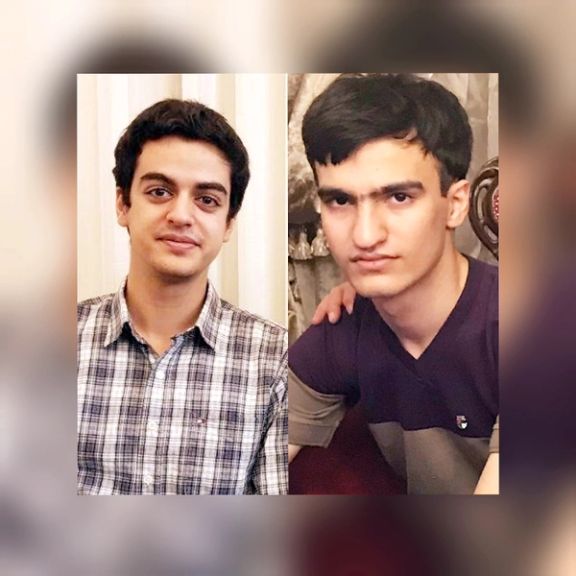
The attorney of imprisoned student Ali Younesi says the authorities want to keep him and another jailed student, Amir Hossein Moradi in the high security ward of the Evin prison.
Mostafa Nili said in an interview on Tuesday that these two award winning students, who are only 21 years old, have been held in harsh conditions of the notorious 209 section of the prison for over 600 days.
He added that despite repeated demands to transfer them to other wards, the prosecutors want to keep them there until a final verdict is issued.
Section 209 of Evin Prison, reportedly the most dreadful ward of the detention facility, is one of three prison sections that are controlled by Iran’s intelligence ministry.
Nili also talked about a video of forced confessions by the two students that was published by the Fars news agency, saying that it was recorded under duress and was not even included in their files. “The question is how the agency even acquired such a document that we, as the lawyers of the case, hadn’t seen them”, he asked.
Younesi, who was the winner of the gold medal in the International Astronomy Olympiad in 2018 in China, was arrested in April 2020 along with Moradi, another award-winning physics student of the Sharif University. They are charged with “corruption on earth”, which is punishable by death in Iran.